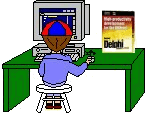
Search

As of October, 2016, Embarcadero is offering a free release
of Delphi (Delphi
10.1 Berlin Starter Edition ). There
are a few restrictions, but it is a welcome step toward making
more programmers aware of the joys of Delphi. They do say
"Offer may be withdrawn at any time", so don't delay if you want
to check it out. Please use the
feedback link to let
me know if the link stops working.

Support DFF - Shop
If you shop at Amazon anyway, consider
using this link.
We receive a few cents from each
purchase. Thanks

Support DFF - Donate
If you benefit from the website, in terms of
knowledge, entertainment value, or something otherwise useful,
consider making a donation via PayPal to help defray the
costs. (No PayPal account necessary to donate via credit
card.) Transaction is secure.

Mensa®
Daily Puzzlers
For over 15 years
Mensa Page-A-Day calendars have provided several puzzles a year
for my programming pleasure. Coding "solvers" is most fun,
but many programs also allow user solving, convenient for "fill
in the blanks" type. Below are Amazon links to the
two most recent years.
Mensa®
365 Puzzlers Calendar 2017
Mensa®
365 Puzzlers Calendar 2018

(Hint: If you can
wait, current year calendars are usually on sale in January.)

Contact
Feedback:
Send an
e-mail with your comments about this program (or anything else).

|
| |
This program tests the generating option of our TComboset
class which generates combinations and permutations of various types.
Permutations are subsets selected from a set of objects in every possible order. That is, {1,2,3}, {1,3,2}, (2,1,3}, {2,3,1}, {3,1,2}, and {3,2,1} are all permutations of the set [1,2,3]. This listing the subsets is increasing alphabetical, also called Lexicographical Up. They could also logically be listed in reverse sequence, Lexicographical down. If we imagine drawing 3 numbered slips of paper from a hat without replacing the slip between draws, permutations represent all possible outcomes. If, on the other hand, we replace each slip after drawing and stop after 3 draws, we would have many more possible outcomes (3x3x3) or 27 outcomes compared to 3x2x1=6 outcomes previously. This With repeats
option is available.
Combinations on the other hand are selected so that no two subsets have the same members. There is only one way to select a combination of 3 out of 3 objects. For selecting two of three objects, the combinatorial subsets are {1,2}, {1,3}, and {2,3}. These also can be selected with or without repetition, and listed "Lexicographical Up" or "Lexicographical
Down"
For combinations, is also possible redefine the order of the members within each set. Normally they are arranged alphabetically, but if they can also
be treated as if each subset were arranged in reverse order. Is is
called a CoLexicographic sequence (and just to make things a little
more complicated the these subsets can be retrieved in Lexicographic
sequence, Up or Down.
So there are 10 retrieval sequences:
 | Permutations Lex up |
 | Permutations Lex down |
 | Permutations Repeat Lex up |
 | Permutations Repeat Lex down |
 | Combinations Lex up |
 | Combinations Lex down |
 | Combinations Repeat Lex up |
 | Combinations Repeat Lex down |
 | Combinations CoLex up |
 | Combinations CoLex down |
In addition functions are now included to return a Random member
from any of the above types, to pass a rank (position in the list) and
return that subset, and to Unrank - pass a subset and retrieve its Rank.
The best way to learn to use units to examine the source for the
attached test program. It tests all of the above options and also
allows you to replace numeral with strings if you want to see arrangements
of letters or car models or fruit.
TComboset is contained in unit UComboV2 which is in turn
zipped with other common usage modules in a Library source file which may
be downloaded below. The unit initializes a single instance of
TComboset with name Combos.
November 24, 2013: ComboTest Version 2.0 posted today has a minor
but significant change to allow larger, 64-bit, sample sizes to be analyzed.
The change was motivated by request from a college professor simulating a
draw of 5 items from a set of 500 values with replacement. There are
more that 285 billion ways to do this. The built in Random
function in Delphi tops out at 32 bit, around 4 billion so I implemented a
64 bit Random Number Generator (RNG) to allow generating random samples
from the 285 billion possibilities.
For programmers, the implications of this change ripples through three
library units (UComboV2, MathsLib, and UBigIntsV4). These changes will
are now included in DFFLibV14.zip and will require reloading that file
to recompile.
| Created: April 3, 2005 |
Modified:
July 29, 2017 |
|
|

